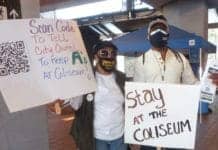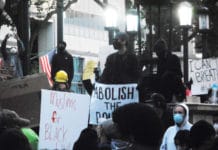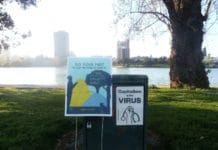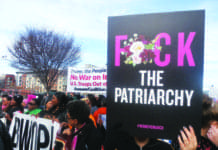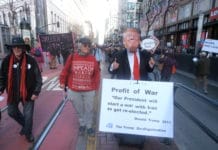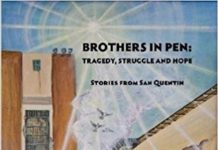by Wanda Sabir
Introduction: Kiilu Nyasha, Black Panther veteran, revolutionary journalist and mother of every movement, joined the ancestors on April 10, and just three days later, Bay View Arts Editor Wanda Sabir opened the phone lines on her morning radio show for tributes to our revered comrade. To listen to the entire show, go to http://www.blogtalkradio.com/wandas-picks/2018/04/13/wandas-picks-radio-show-special-tribute-to-kiilu-nyasha or listen here. – Editor
Richard Brown
My name is Richard Brown, and I’m a former Black Panther. This is a very sad time for me because we lost a true revolutionary fighter, Sister Kiilu. Everything that can be said about a revolutionary fighter can be said about her. She was a tireless freedom fighter, and she always amazed me with the energy she put into supporting the struggle. She never lost faith; she never stopped fighting. She was a true warrior, and she fought with everything she had till the very end. I will truly miss my sister. All power to the people!
Pete O’Neal

This is Pete O’Neal from Imbaseni Village in Tanzania. I wanted to express our sincere and heartfelt condolences. We were shocked when we were informed, and I wrote, “What heartbreaking news! Poleni sana [We are very sorry, in Swahili]. Our struggle has lost a dedicated and tireless soldier. All of us here at UAACC [United African American Community Center] mourn her passing but know clearly that the inspirational messages she lovingly shared are immortal. It is with that thought in mind that I can say with total conviction, “Sister Kiilu LIVED!”
So poleni sana. And if I may, just to indicate that these condolences are from all of us here at UAACC, I’d like for just about four of our children to be able to deliver in Swahili their condolences. [The children speak.] I just want you all to know that we mourn with you and I think it’s important to realize that all of the old soldiers are fading and this is going to continue. But if in our labors and in our struggles we have inspired cadres of younger people to pick up the torch and to carry on with the struggle, then our labors have not been in vain. So I wish you all well, poleni sana, much love from Imbaseni Village.
Charlotte O’Neal (Mama C)
Even though we all know that she was ill, to realize that Sister Kiilu has actually made her transition is very, very painful. I saw her last in Bobby Hutton Park during the 50th anniversary celebration of the founding of the Black Panther Party. She was buoyant, in a jovial mood and laughing and talking and hugging me and others from the throne of her wheelchair. And that chair was indeed like the throne of a queen. That is how she carried herself. She was indeed a warrior woman, queen – a Black Panther icon queen and my sister-friend.
May good memories of Sister Kiilu comfort us all in this time of grief. I recall times that we broke bread and shared coffee and history. I recall several times when I was on her television show over the years and how we just talked revolution as homegirls and sisters. She was a kind person, a humorous woman, and I will always remember her beautiful smile and that halo of white hair that framed her beauty.

Our comrade Sister Kiilu Nyasha has joined the ranks of our most honored ancestors. My dear Sister Kiilu Nyasha will always be remembered and lifted up, her steadfastness, even in times of physical limitations, she was always there for me and others who needed her. She kept working and writing and drawing and inspiring everybody, even when her mobility was impaired. She never gave up the fight for freedom and enlightenment. We have lost a true pillar of the community.
May our dear Sister Kiilu rest in peace and in power in the realm of the ancestors. She will never be forgotten. Her example was a most powerful one, of strength and courage and love for the people. She inspired all who knew her. We will always honor her memory by working harder to bring a healthier, more inclusive, more beautiful world into elevation, and I salute Comrade Sister Kiilu with love and blessings. She will certainly be welcomed into the realm of revolutionary spirits.
May Comrade Sister Kiilu Nyasha be welcomed into the realm of the revolutionary freedom fighting ancestors, and may we always honor her with our own words. I salute Comrade Kiilu Nyasha, one of the best of who we be. I can hear her now as she shouts, “Freedom ain’t free, y’all!” Rest well, my dear comrade sister. Asé, asé.
Nedzada Handukic
I would like to first start off by saying thank you all for all the condolences and all the love that everyone has shown toward Kiilu by posting beautiful stories and pictures and taking time out of everyone’s life to acknowledge what a loss this is to our families, our communities, our world community as we know how much Kiilu worked internationally and how she struggled for all the people of the world.

This is a very difficult time for me personally. I’ve never experienced a loss this great. Kiilu was my family. I met her when I was 17, and since then she was my ace in the hole, my home away from home. She taught me life lessons as well as political lessons, and I’m just honored to have had her in my life. I feel like now her words ring even louder. Sometimes we take folks we know for granted folks and things that they say, but I just feel like in these last few days, I can’t get her off my mind and things that she would say and her routine tireless, endless struggle every day. We used to talk and I would say to her, “You have to take a break sometimes. Give yourself a day.” And she would say, “No, Nedzada, I’ve got to listen to this news and I got this email and I need to do this, this and this. I’ve got to go to this protest.” She always inspired us to be the best that we can. I feel like I have so much to say, and at the same time a huge loss of words.
I think that one of the best places to start [to learn more about Kiilu and her work] is KiiluNyasha.blogspot.com where folks can take the time to look through that website and see what we’ve done to the best of our ability to keep her shows and articles and various art pieces accessible to everyone. So there’s various categories of that. Also on YouTube there are lots of links to all her programs, Freedom Is a Constant Struggle. I helped engineer in 2007 with her, and that’s the first time we worked together. So from when she brought Freedom Is a Constant Struggle from the radio to public television, you can pretty much find everything from 2007 until current, as well as her articles, to get a better idea of Kiilu’s principles and ideology.
I think she was very aligned with Mao’s principles and she very much believed in “the little red book,” believing in self-determination and speaking out against wrong, and people checking their facts, doing their homework and living in hard struggle. I think that’s the best way I can sum up Kiilu in a few minutes. If people want more information, devorah major did a wonderful interview with her, and that’s on devorahmajor.com, where Kiilu spoke about some of her life experiences and how she got into radio and how she was able to transition to all these different media. So that’s a place to start.
Ida McCray
Kiilu was more than a comrade. She was the kindest, most loving person I know. I just want to say Kiilu was a woman with a huge heart full of gold. The first time I met her was when she, Linda Evans, came up to Dublin to meet us, in a wheelchair. And occasionally from her little savings she would send us money. Kiilu’s heart was huge, full of gold. I’m honored to have known her, but most importantly the kind part of where she allowed my family to be a part of her family and in that she wouldn’t have been able to do a lot of these things if it hadn’t been for Nedzada, so we’ve got to remember Nedzada. I just really want to say that she was basically a conscious woman. We can’t forget that this was part of not only her loving family, but part of her income; so we’ve got to remember Nedzada.

Sister Kiilu also was able to employ my daughter because none of this could happen had people not been around her to assist her. She won her fight of not being hospitalized. We talk about imprisonment, but she always talked about imprisonment in a hospital and how she was not going to be imprisoned in an institution. And she won that. That’s all I can say, but don’t forget Nedzada and all those who stood by her side to make it possible for her to be that queen on that wheelchair with a crown. Thank you.
Raymond Nat Turner read his poetic tribute, published in the May Bay View and online at https://sfbayviewnews.wpenginepowered.com/2018/04/for-sistar-kiilu-nyasha-freedom-is-a-constant-struggle/.
Pam Africa
You know Kiilu. It was a must that we visited Kiilu whenever we came to San Francisco. I, like most people, was totally devastated because I really thought that I would get to see her when we came to San Francisco on the 4th for an event on the 6th for Mumia’s new book. And we were all excited to get together on that.
But Kiilu, we are talking about a constant struggle and this sister was just it! We have to honor her by doing the work that she was doing. Pick up the work. This sister and her program, “Freedom Is a Constant Struggle,” she meant that! She lived that.
One of the things that I remember about Kiilu is that she could make that wheelchair – you could tell that Kiilu was in a good mood and that she was happy by the way that wheelchair moved. And you also could tell when she was upset with someone because that wheelchair, when she moved you could tell: Somebody’s in trouble! Here comes Kiilu!
But that smile, those twinkling eyes, and her fearlessness in confronting anyone, anyone who was putting out misinformation. And you know, that’s Kiilu. And always sharing her knowledge. I do have some of Kiilu’s tapes and while I’m down here I’m going to be a collector, because every word that she said, every activity that she did is worth keeping.

So I’m going to get out of the way for someone else. My sister Mona might get a chance to call in. I know her heart is heavy as well.
Kiilu left us a lot. But I know as sure as we come here, we’ve got to go, and I’m saying from day one to the end, Kiilu was all that and some more. She taught, loved children and the youth. I would go to her house, and Kiilu would have youth in there, just educating, teaching. Her walls, and that million dollar view that she had right there in Chinatown – being in there and going over the walls and her drawings that she had, and then, going swimming with her. She was truly free in that water. I loved going there with her. And my children, they all went swimming. I stayed on the outside. You had to see Kiilu in that water.
So, Ona Move! I’m looking to see everyone there on the 6th of May, and I hope there will be a memorial about that time. I’ll be in town from the 4th to the 7th.
Ayana Labossiere
Hi. This is Ayana Labossiere. Thank you so much for having me. I’m calling in to honor Kiilu because she was family, not by blood, not actually an aunt, and also obviously someone I had tremendous respect for, and I’ve been listening to everybody’s thoughts and prayers coming in, and their recollections of her. It’s beautiful, and I’m so honored that you’re doing this for her.
Kiilu – I think back and I feel like I’ve known her my whole life. She and my dad are very close, and the way that they got introduced, I believe, is working through Haiti. And that’s the thing about Kiilu that I would always marvel at, because she just had the energy of 10 people, it felt like. She was involved in so many different struggles and supporting so many different amazing causes. She was always supportive of the work that we do in Haiti with the Haitian people, for decades. She was tireless and always sending information out.
And then also, getting to know her on a personal level, I always felt really blessed. And I must admit this is kind of a weird thing for me to be calling about. This is still really shocking to me. I still feel that if I call her, she will pick up the phone. I still expect to get an email from her, or two or three, you know, about this event or that event.

But I will just say that some of my best memories of Kiilu are from when I was a kid. That’s when I really got to know her, and I remember she actually had me on the radio back when I was 8 years old. So back in the ‘90s, she had me on the radio, and she was doing something where she was featuring and spotlighting kids. The last person just spoke about Kiilu and how much she loved kids. And that was really obvious.
She would say that kids have a story and they have a perspective, and at 8 years old, she had me on the radio with some other kids. To feature children – and that was my first exposure to that world, and it was really breathtaking to me. From then on, she used to give me rides on her wheelchair, and used to also give other kids rides. Because I’d look at that electric wheelchair that she used to have, and she could see that me, as a kid, I wanted to get on it, and she used to give us rides, and she was always so cool and great.
She was always offering me advice as I got older. And I’m so fortunate to have gotten to know her, not just as an aunt figure, and not just as this amazing activist and organizer, but as this amazing woman that she was, and her wisdom was really always very wonderful and timely. And she would give me great advice for my life. My mother passed away six weeks ago, and Kiilu was there for me with that. So again, it is still really shocking for me. I feel there is a piece of my brain that feels like she’s still alive, and it hasn’t fully set in.
Just two weeks ago, or a week and a half ago, I was blessed to have an amazing conversation with her about life and about death, and just getting some perspective on things. And so I know she’s in an incredible place, and I know that I’m just so fortunate, I’m just so blessed to have known her and to have had her in my life. And for everybody else who felt the same way, because she made a lot of people feel the same way. She loved so much. We’re all so fortunate.

I do want to say one other thing if I can, and I hope I’m not rambling too much. It’s just that I’m still collecting my feelings on this whole thing. She was actually promoting our event this Saturday, the Haiti Emergency Relief fundraiser. It’s a poetry event, and she was actually getting ready to put that out, and so now, since she was going to promote it for us, it’s something to honor her. She was a really, really great friend to everybody in our committee [Haiti Action Committee] and our organization, and the event will be in her memory.
And so if you’re around, if you’re in the Bay Area, you should come on by and enjoy some really amazing poetry and celebrate her life with us. Avotcja, Rafael Jesus Gonzalez will be there, Carolyn Scarr – in her honor, in her memory. For some of the work that she really enjoyed and took an active role in, it’s at 3-5 tomorrow at St. John’s Presbyterian Church, 2727 College Ave. in Berkeley.
Haiti Action Committee was founded in 1991 after the coup d’état that overthrew democratically elected Aristide. It’s been around since 1991, and the goal is to support grassroots and activist groups on the ground in Haiti, and Kiilu – she’s been involved in helping us through decades. The Haiti Emergency Relief Fund was founded in 2004. It’s our sister organization, and it was founded after another coup d’état that the U.S. and France and Canada perpetrated against the Haitian people. And so as you can imagine, those were both really turbulent times and so folks required a lot of support – activists and community organizers. Kiilu did so much for that effort! That’s an understatement. I’m failing to find the words, but she was just so instrumental in all of that. Folks just got back from Haiti, so there will be an update shared, I believe, but I know it will be centered around poetry for peace and justice and to honor National Poetry Month, and now with Kiilu’s passing, to honor her memory as well.
I do want to reiterate how much I loved Kiilu and how she will be greatly missed and how she has touched my life, and I – sorry I’m getting all emotional – but how I just learned so much from her, and I love her so much. So thank you, Wanda.
Charlie Hinton
There’s been so much said that’s so true and profound. I work with Haiti Action Committee also. I work with the Prisoner Hunger Strike Solidarity Coalition Committee to End Sleep Deprivation. I used to visit Yogi, and no one has mentioned Yogi yet. Hugo [“Yogi”] Pinell was really one of the loves of Kiilu’s life, and they communicated. They wrote for many years.
I visited him twice at Pelican Bay, and after I had visited him on Saturday, I’d call Kiilu and tell her everything we talked about and send her love to him and his love to her. I really got to know her better when she was in the hospital very near my house, at Davies Hospital after her hip collapsed about seven or eight years ago, and she was no longer able to walk, and I would shop for her at Farmers Market and Rainbow Grocery and I would take food over to her house and also other treats that she enjoyed. And we would just sit and talk. I talked to her for the last time I think Thursday night.

The thing that most stands out for me about Kiilu is her integrity. She just stood up for what she believed! And I didn’t agree with her a lot of the time. I’m sure a lot of people didn’t, but she was just so thorough and firm and strong and so committed and dedicated and relentless – just like a rock. And that’s the thing that will always stick with me and sets the example for me of just how to be principled in this world. Because she would sacrifice for her principles. She did not move from her principles. In this world that we have right now, I think that’s such an important lesson.
The other thing for me personally that was so important was her support of my work with Haiti Action Committee, with the prison work, and especially with my – I do a show [“Solitary Man”]. I wrote it as a solo performance, and now it’s a two-person play with my friend Fred Johnson from New York, and Kiilu was part of that from the very beginning. She helped me with the final edits before it was ever performed, so her voice is in it. And she constantly promoted it. For every performance I had, she sent out an email asking people to attend, and one of the very last emails she sent out on Monday before she passed away that night, was for our show, which is going to be next Saturday at the Black Rep in Berkeley. Fred and I will also be dedicating this show to Kiilu to thank her for all of her work and for her life and for her wonderful example.
Fred Hampton Jr.
Good morning, good morning. How you doing? This is Chairman Fred Hampton Jr. First and foremost, revolutionary condolences to the community regarding the transition of Comrade Kiilu. I was talking to Pam Africa yesterday. We got the word about her passing. My memories of Kiilu are our discussions, amongst other things, in particular about the importance of internationalism. In fact, I recall when I returned from a delegation in regards to the campaign for Mumia Abu Jamal in Ireland. Typical of the discussions, we were talking about the different political dynamics and the importance of internationalism.
Also, on a minor note, whenever I would come to the Bay Area, if I didn’t get to stop by to see her, she would call Pam Africa, and she would say, “Chairman Fred came, and I haven’t seen him yet.” That’s just one of the memories I have of her. So I salute Comrade Kiilu. Right on. Revolutionary love and respect.
Nedzada Handukic

I think from my own personal experience and just being around her during those times, she was always led by her love for the people and her love for the revolutionaries who were doing whatever particular work. You mentioned Chris Hani and Dr. Martin Luther King, Tookie Williams, and just so many other political prisoners and people that she admired, and she had love for. I remember her saying, “People ask me, will you do my portrait?” and she would say, “I can’t do just anybody.” She wouldn’t draw just anyone. Does that make sense?
And so one of my favorite presents – I was so young – I remember she was doing something in secret. And I remember I was like: “What is she doing? I don’t understand,” because we were always so honest and forthcoming, and we helped each other with everything. So I was just like, what is she secretly hiding? And come to find out, she was doing a portrait of me. I just remember so many little things like that. I have such a personal and tender relationship and sweet memories of her.
And I have all these revolutionary political lessons, and just hearing her voice and her opinions. I think one thing we can all agree on, that Kiilu didn’t hold back, that she would always put her two cents, and she would just always say, “Unity, criticism, unity,” that it was so important for us to call each other out on things if they weren’t correct all the way. And I think through her artwork and her writings, that message over and over came through.
Marina Drummer
This is Marina Drummer, and I’m responding to your request for memorial pieces for Sister Kiilu. I think most of us are still in a state of shock. Although her health was not good these last few years, I don’t think anyone expected that she would go as she did these last few days. I want to say there is a hole in my heart where Kiilu lived these many years. We met back in the ‘90s. We spent a lot of time together over the next decades going to events, political and also cultural. We would always spend at least a day a week together until I moved from the Bay Area. I’d visit once a week or so. We’d go to lunch or just spend a few hours and talk in her Chinatown apartment.

Kiilu was, in a word, the most uncompromising comrade I’ve ever met. She was a revolutionary warrior to the core. Her strong beliefs sometimes meant that she would lose friendships, but as much as she valued her friends and needed their support, she wouldn’t tolerate any equivocacy from those around her when it came to her political beliefs. She was also tireless. In spite of all the challenges that she was facing physically, she would prepare her bi-monthly TV program and would roll from Chinatown to the BAVC studios in the Mission rain or shine to be sure that her unique programming on critical issues would continue.
Her life wasn’t easy due to her physical limitations. She needed help with just about everything. But those challenges didn’t stop her. I spoke with Kiilu Sunday, two days before she passed. She sounded worn out but had plans for the next program and expressed her gratitude that Nedzada, her beloved caretaker and friend, was back in her life more frequently, and that her daughter Lalia was in touch and sounding healthy and happy.
To those special friends who kept the faith with Kiilu these last years – Pierre, Charlie, Nedzada, Ida – she always expressed her gratitude to those who kept on staying in touch with her. I know as much as she will be missed, I’m really grateful that her passing was peaceful – in her home, in her sleep, not the dreaded hospital that she so hated. All her trials are now over, and I imagine she’s arguing the finer points of revolution with Hugo and George Jackson waiting for the rest of us to catch up with her. Asé, Kiilu. You were a true friend and a most important mentor. You will be very much missed!
Wanda Sabir
I met Kiilu as a radio show celebrity, “Freedom Is a Constant Struggle” on Friday nights on KPFA. I would tune in and listen because her program was such a political education and, I felt, such a necessary one – and I learned so much about what was going on here in the United States and how what was going on here was affecting the policies and the lives of so many people throughout the world, negatively! And so when I had the opportunity to meet Kiilu for the first time, I was like, “Oh, my God!” She was such a celebrity. I think my feelings of awe never, never waned or wavered after I got a chance to meet her personally.
And then when I found out that she was a Gemini like Raymond and I are, it was like, “Yeah!” That was so awesome. Other signs in the Zodiak are awesome, too, but there’s something about being a Gemini. So Kiilu being in that particular family too was awesome. And I remember when I did the first Poetic Protest, and this was in response to what was going on in Los Angeles after the police were acquitted after being seen and witnessed beating Rodney King, who is now an ancestor – Asé, libation to his memory and his work and his suffering and his trauma.
When they got off and when LA was burning, we put on a program. It was the first Poetic Protest. We’ve had lots since then. We had one for Mumia Abu Jamal when he was going to be executed, on Marcus Garvey’s birthday, Aug. 17. And then we had another Poetic Protest around what happened in New Orleans and the Gulf around Hurricane Katrina. Kiilu volunteered her radio space to do a broadcast to get the word out about what was going on in Los Angeles and our desire to raise funds for the Brotherhood Crusade to have funds for the programs they had already developed for the summer as well as for senior transport, because most of the stores had been burned down, and so elders were finding it hard to get around. And that was really, really awesome.

And I just loved to witness her love for people, particularly for our people who are not a part of the daily discourse, people who are locked up, people who are locked up because they love the people and their love for the people sort of took them out of circulation. And it is so easy for people who are not with us to be forgotten. But Kiilu never forgot.
And then, she’s a woman who’s struggling physically. She would show up in what looked like a Rolls Royce wheelchair. I mean that thing was padded, and she could raise it so she was taller than everyone else; so when we were in a protest march, she could crank it up and crank it up till she was about 6 feet tall, and she could see over the tallest heads. And then when she and Jane, who was also an ancestor who preceded her, would be rolling together, we’d be like, “Watch out, move out of the way, here come the Warrior Women, the Amazons!” It was like, “Wow!” It was really, really super.
I remember when she told me about devorah majors’ dad, Reginald Major, and his book, “Black Panther,” I think. It preceded quite a few of the other books. She was such a scholar! But she was accessible. She was living this knowledge and history. And you talk about uncompromising! She had really good postures, like she would sit up. You sort of think about her posture and her postures – her physical posture and her philosophical posture. She was formidable. She would scare people into like, “If you’re not coming correct, just get out of my face; I’ll run you over.” Not physically, but maybe that, too. I mean, she was “Wow!” Yeah: loved the woman. And she was so beautiful too, to look at. She was so beautiful.
Nedzada Handukic
If I could chime in a little bit and piggyback on what you were saying: I remember walking, leaving the house, going to a protest, or just going somewhere, and she would say, “Come on, Nedzada, we don’t have to wait for the bus. We can just roll down there.” And I’m like, “Wait! I’m walking, but you’re rolling in your wheelchair.” I’m over here trying to keep up with her. That’s when I shed a few pounds. She’d always say to me, “You’re beautiful now, but watch when you work with me, and you get on my diet, you’re going to be even more beautiful.” And she would always speak about that. The people around her would have no option but to eat healthy. That was the munchies that were available.
Kiilu speaks in Wanda’s Picks Radio interview from Black August 2009
Wanda: I have something from Kiilu when she was on my show eight years ago, Aug. 7, 2009:
Good morning, Wanda. Thank you for inviting me to be on your show. Bio? [Wanda had asked Kiilu for a brief bio about her life.] It’s hard to be brief when you’re 70, but some highlights of it for your purposes would be:
I joined the Black Panther Party in New Haven, Conn., in 1969. I started off first as a rank and file Panther and remained so, but also took on the job as a secretary to Charles Garry and David Rosen and other lawyers who were defending the New Haven Panthers in a capital case that included Chairman Bobby Seale and the people’s power that we organized set them free.
Then I went on to come out here and work for the Sun Reporter during a very intense time in which the assassination of George Jackson took place as well as Attica. I left the Sun Reporter when my article on Attica was chopped and continued to work full time, of course. I produced a couple of newspapers on my own. The first one was a collective, By Any Means Necessary, that was meeting regularly.
My address at the time was 1717 McAllister in the Fillmore, and we had political ed[ucation] classes on a regular basis and produced a newspaper, a tabloid, about what was going on at that time, which had to do with Attica and the Aug. 7 Marin Courthouse Slave Rebellion, that we’ll talk about, I’m sure, since this is the anniversary of that date, and of course the assassination of our beloved comrade Brother George Jackson.
Fast forward to the anti-apartheid era. Between ‘75 and ‘80, I was doing most of my propagating in the hospital. In 1974, my daughter was born. I had a teenaged son at the time. So I only have two kids, and they are both grown, needless to say.
In 1983 I got involved with KPFA doing commentaries for a program called Traffic Jam that Philip Maldari hosted from 4:30 to 6 on KPFA at that time. And then I got into the anti-apartheid era and used radio a lot for propagating information about the struggle in South Africa as well as advocating for the release of Nelson Mandela and other political prisoners. And of course all through this time, I stayed involved with the struggle to free political prisoners, some of whom I’ve been writing to for damn near 40 years.
So I guess, up to date, I started working for the Sun Reporter as a columnist, and I had a program, Freedom Is a Constant Struggle, on KPFA in the early ‘90s before they cancelled Freedom, and then I took Freedom to San Francisco Liberation Radio and Free Radio Berkeley. And I lasted two years in Berkeley on Free Radio Berkeley on a morning show that was from 7 to 9, and I loved that: total freedom, no FCC to worry about.
So where am I now? – doing Freedom is a Constant Struggle on Access San Francisco every Friday at 7:30, with a rebroadcast at 3:30 on Saturdays and 6:30 on Mondays. And just for your information, today I’ll be interviewing Big Man and BJ – Billy X Jennings and Elbert “Big Man” Howard. Needless to say, they were among the original Panthers out of Oakland and have a long history of struggle, and that should be a very interesting 22 minutes.
The very first [radio] program that I was invited to was kind of a fluke. A friend of mine called me and told me that Philip Maldari was gathering people at a youth news station in Oakland that was wheelchair accessible. The old KPFA wasn’t (accessible) in the ‘80s. I think their new studio didn’t open till ‘91. So they parked my motorized wheelchair downstairs and carried me up in a manual chair when I started doing some programming there.
That was the first time I met (disability rights activist) Jane Jackson, the late Jane Jackson, and Judy Heumann, who became the head of a world disability organization. She went to D.C. and became a big-wig in the disability rights movement. [According to Wikipedia, Heumann co-founded the World Institute on Disability, later working in the Clinton administration, for the World Bank Group and for the Obama administration as special adviser on disability rights.]
Philip just put me on the air spontaneously, and at that time I was discussing the underutilization of physical therapy facilities, and it came back to bite me again just recently when I needed physical therapy, and they’re underutilized now. That hasn’t changed, except to get a little worse. And then he kept me coming back. One day, I came and said, “I want to talk about this. I don’t know how it relates to disability.” And he said, “Well, it doesn’t have to.” So I was on a roll after that.
And then when August would come around, I would always do Black August, and you have a tape there that Philip Maldari actually brought to me one day because once I did my first Black August piece, and we talked about those events, he realized how much I loved George Jackson. So he came in one day with that Karen Wald tape that I had never heard, and it was already about 12 years old.
But I was on the East Coast when he recorded that, and so I kicked back, and to hear his voice again was going to be such a kick that I put earphones on and lay back on my bed to listen to it for the first time. And I was shocked to find that he had mentioned my name – I used to be Pat Gallyot – in the early part of the tape. That tape was pretty precious to me, needless to say, and just a big surprise. I’ll always be grateful to Philip for giving it to me, alerting me to it.
Charlie Hinton remembers Kiilu’s comments about her early life
One thing She talked to me a lot about was that she was in foster care a lot in her youth. And one of the homes where she was placed was a wealthy Black family. I think a lot of her class values got developed through there because she saw the bourgeois life and really rejected it. She felt oppressed by it. She felt used. She felt like she was used like unpaid labor, a servant in the household. So that was one experience that had a very profound effect on her.
Also, she was a very skilled worker. She was the very first Black person to work on Madison Avenue. I forget what kind, but she had excellent skills. And that was what allowed her to be the secretary for Charles Garry at New Haven during the trial there. She actually used her secretarial skills to become a legal assistant for that whole trial.
Bay View Arts Editor Wanda Sabir can be reached at wanda@wandaspicks.com. Visit her website at www.wandaspicks.com throughout the month for updates to Wanda’s Picks, her blog, photos and Wanda’s Picks Radio. Her shows are streamed live Wednesdays at 7 a.m. and Fridays at 8 a.m., can be heard by phone at 347-237-4610 and are archived at http://www.blogtalkradio.com/wandas-picks. The Bay View gives special thanks to Diana Bohn for transcribing this 90-minute show.

 Store
Store



